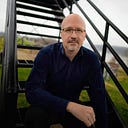In 2019, Artemis, an Aquarius, was born in a bright, sterile box on the ground. Now she exists in the air.
She does not yet know what schools teach about our prehistoric ancestors; the ones who first jabbered in discernible languages and used complex tools. In fact, it is possible that she will never sit in a classroom and learn that they traveled in small groups, consisting of no more than a few trusted companions. Or that they spent three or four hours a day scrounging together enough to live and then the rest of the day telling stories, singing songs, inventing things and fussing at the little ones. She may never hear from a schoolteacher about the foragers who existed on the ground, chasing prey and running from larger predators.
This is so because she may never go to school at all, at least not in the way we think of it now. That’s an irksome idea to her father, but it is unlikely that she will ever give it a second thought.
She will in time, I suspect, learn (from somewhere) that our more recent ancestors abandoned life on the ground so that they could burrow underneath it. That we disappeared underground every day, during all the daylight hours. That we left our small groups of trusted companions to pull rocks out of the earth with people we did not know, so as to sell those rocks to more people we never laid eyes on, so that the rocks could be burned away to nothing.
And that we crammed ourselves into dim boxes, away from the sun and the rain and the wind, breathing in the belches of chemicals emitted by the machines we were shackled to, with people we never met, to make things that were pitched in the ocean by others of our kind who we would never meet, to satisfy some end that we can’t really define.
She will learn that we traded those boxes for bigger boxes, climbing ever higher in the sky, exchanging darkness for fluorescent brightness, the toil of our hands and backs traded for the toil of our eyes and arteries. That despite our great height, we still diligently avoided the daylight, subsisting on a diet of Vitamin D pills and non-moving foods wrapped in plastic. That we knew no one at all, not even our closest companions, but at least we no longer fell prey to larger creatures.
This, she will learn, was thought to be the natural progression of things. That it was normal, for a time, to harness a forest’s worth of resources per family every year, or to drink only one beverage from a container that never dissolves, dissipates, or disappears, or to combust an engine that runs on dead animals we pulled from the ground to go less than a mile away and buy box after box of items we don’t need. That we believed the ground was ours, that the ground was forever, that the ground was something that gave and gave and never expected anything back.
She will eventually learn how our expectations were suddenly turned upside-down. She’ll learn that the old way of thinking, like all old ways of thinking, did not surrender quietly. That it took a violent turn of events, one that scared everyone into sanitized bubbles, surrounded only by a few trusted companions, to recognize the fragility of what we build and the inevitability of its collapse. That we discovered we would be chased by predators no matter what, if not on the ground, then in the air; if not massive and fearsome, then silent and invisible.
As such, she will learn from a machine built by other machines that we abated the total disintegration of our species by learning to exist in the air. To raise our children on the wind, as infants in bubbles, not being able to reach outside their latex shells but able to traverse the globe in an instant. To sit at keyboards and peer into flickering rectangles that show us the future, the past, the entirety of everything our ancestors ever learned or invented or fell prey to. To transmit our faces, our voices, our tears and laughter and sweat and shit and blood and whole bodies, through electrical pulses, in clouds, in particles and waves, to look each other in the eyes from half a world away. To cheat the boundaries of language, country and mortality by being both infinitesimally local and infinitely nonlocal all at once. This won’t be a big deal to her.
She may never know the joy of noisy Christmases. Of crowded dinner tables. Of state fairs or Mardi Gras or soccer stadiums or Disney World. Of warm skin-on-skin contact. Of the exchange of wet things that our bodies secrete. All these may be relics of the past by the time she gets around to learning about them.
She may only know a life of three or four hours a day spent scrounging together enough to live and the rest telling stories, singing songs, inventing things and fussing at the little ones. She, like our first upright ancestors, may believe that there is no other way to live. She may be right.
Artemis, an Aquarius, sealed tight in a sterile bubble, travels just under the speed of light, staring for just a few seconds at a time into the canals of Venice, so clear that she can see the bottom, or the untarnished sand at the base of the Great Pyramid of Giza, or the hazelnut gaze of a self-portrait of Frida Kahlo, her view unobstructed and uncluttered. As her parents gasp and clutch their chests and stagger and die, she will live forever, her pixelated likeness darting freely from continent to content, in a full spectrum of brilliant, ultraviolet luminescence. She was born on the ground but exists in the air.
(originally published in LEO Weekly: https://www.leoweekly.com/2020/04/growing-isolation-will-eventually-learn-expectations-suddenly-turned-upside/)
